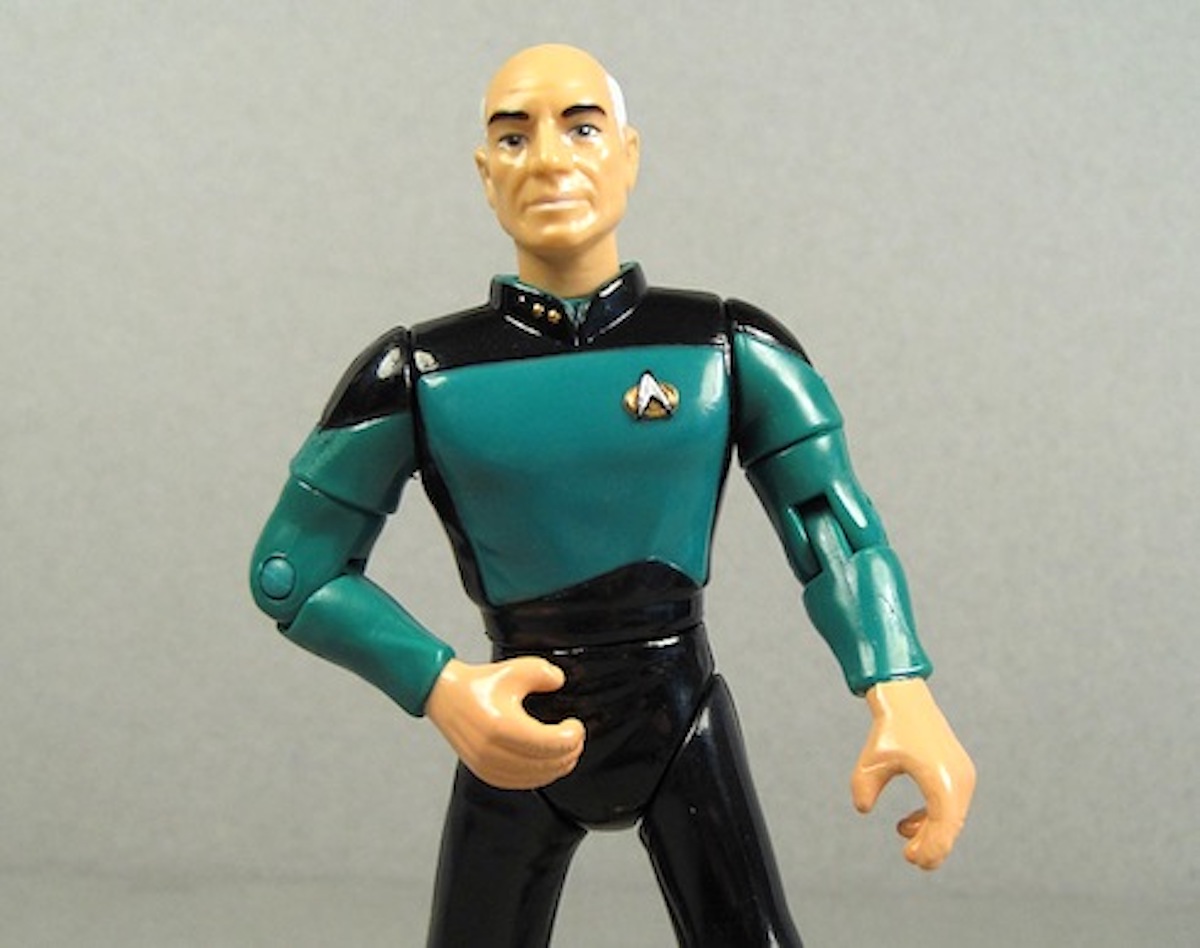“Your life ended about five minutes ago, under the inept ministrations of Dr. Beverly Crusher.”
After “Face of the Enemy,” Season Six’s other best episode is “Tapestry,” which ends up on more top ten lists, although I like it slightly less. Still, there’s little arguing against it. It’s the series’ last great Picard episode before “All Good Things,” and it’s a marvelous Q episode to boot, largely in that it’s not the usual “Q is a goofball!” routine. Here, with a nice balance of caring and malice, Q throws Picard into his own personal It’s a Wonderful Life loop, after the Captain has been killed on an away mission. We stitch in the great piece of the Picard backstory, as verbally outlined in “Samaritan Snare” – the night he got stabbed through the back during a bar fight, while still a cocksure Starfleet cadet.
Jean-Luc Picard, the only man who ever took a Nausicaan blade in the heart and burst out laughing. The plotting of youthful Picard has always been somewhat haphazard in the history of the show, possibly because it’s so difficult to imagine the Captain as anything other than a smoothly competent, diplomatic, semi-fussbudget. Yet we know from numerous sources that he was arrogant in his youth, got into serious trouble at the Academy and even more serious trouble here; and we can pick up the rest from Tom Hardy in Nemesis. The bar fight at the Bonestell Rectreational Facility is pitched as Jean-Luc’s turning point, his “bottoming out” moment, and so here we are.
Naturally, seeing it all for real can’t measure up to the imagined version of the story that Patrick Stewart so cunningly wove into our minds with his monologue in “Samaritan Snare.” Wisely, the episode lets Stewart play himself as a young man rather than casting a different actor, but this also means that we never (except in a brief, white-room replay that Q concocts) get to actually see the brash young version of Picard, leaving him forever out of reach. I’m also somewhat miffed at the arbitrary choice of friends: maybe I’m off on my history, but if Jack Crusher, Walker Keele, and Picard were inseparable at the Academy and hoped to be posted to the same assignment upon graduation (per “Conspiracy”), why do we have Corey Zweller and Marta Batanides here?
In the latter case at least, we have an answer, when Picard knocks boots with his formerly-friendzoned female colleague. Written by Ronald D. Moore, the episode has an appropriately male viewpoint on the opportunities of temporal do-overs: all well and good for undoing that potentially fatal mistake in the bar fight 50 years ago, but while we’re visiting, let’s circle back on some old relationships and figure out who we’re gonna bone. When I was younger, this sort of time travel thought experiment held much more appeal for me, but as I moved into my thirties, I began to take closer stock of the way my own personal tapestry was stitched. Sure, like anyone, I’ve got a long list of things I’d like to go back and change, but – also, I hope, like anyone – there are far too many good things in my life right now that I can trace back to their nascent moments by way of events that might have seemed like mistakes or wrong turnings at the time. And hey, I figured this all out without Q! Yay for me.
The great horror of the episode, for me, remains the five or ten minutes in the alternate version of the present, when “Lt.-J.G. Jean-Luc Picard” turns up in his blue astrophysics uniform and finds that life has calmly passed him by. To be fair, the overwhelming majority of us are the anonymous day-players in the background while the bridge crew go around saving the universe, and there’s no shame in that. But blue-shirted Picard has become one of the great, sad metaphors of my life nonetheless. I’m 37 as I write this and will be 38 by the time it gets posted. I’m happy with my life and the people in it, and as mentioned above, if Q gave me the chance to travel through time and change something, I wouldn’t take it.
But I’m aware that I ended up in the blue shirt anyway. When I first saw “Tapestry,” I hoped I was the sort of person who, even if it took a knife in the back, would make the kinds of choices that would lead to a brilliant, one-in-a-million, foreground life. But no.
Solace, at least, can be found in the two qualities that Picard singles out as the defining attributes of his being, when confronted with his alternate: passion and imagination. I didn’t really think about it until I was watching the episode this time around, but yes, those are the keys, I think, to a good life, or at least a good life as I define it. With those in place, the colour of one’s uniform doesn’t ultimately matter. The tapestry is whole.

Blogging The Next Generation runs every Tuesday as I work my way through the episodes of Star Trek: The Next Generation on blu-ray. Season Six is in stores. Season Seven will conclude the blog in early 2015 – you can pre-order the final season now.
